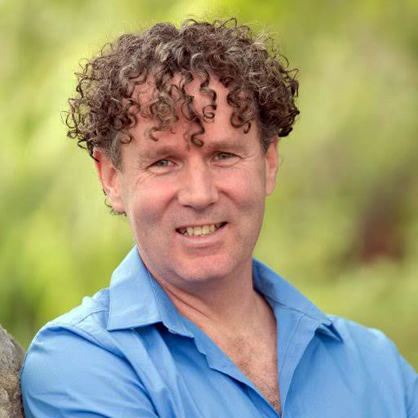All pain is subjective.
Like an attempt to describe the colour 'blue', an accurate description of pain relies upon personal experience.
By definition, pain is “an unpleasant sensory and emotional experience associated with actual or potential tissue damage, or described in terms of such damage” (IASP, 2019)
Where does pain begin, and why does it begin?
Questions of this kind have prompted a new wave of investigative efforts in the profession of physiotherapy and the work of alumnus, Professor Peter O'Sullivan occupies this nexus.
New research horizons
O'Sullivan came to Otago to study in 1984 from Palmerston North after emphatic advice from his school careers advisor to avoid physiotherapy. The engaged and personalised nature of the profession however soon attracted his full attention.
 He found that Otago's backcountry offered huge scope for adventures in mountaineering, rock climbing, tramping and skiing. A successful climb of the 3,027 metre Mount Aspiring (Tititea) and rapid ski descent of a snow-covered Mount Cargill (Kapukataumahaka) remain etched in his memories.
He found that Otago's backcountry offered huge scope for adventures in mountaineering, rock climbing, tramping and skiing. A successful climb of the 3,027 metre Mount Aspiring (Tititea) and rapid ski descent of a snow-covered Mount Cargill (Kapukataumahaka) remain etched in his memories.
After completing his final study year in Christchurch O'Sullivan went on to clinical work at Christchurch Hospital but finding his local options for advancement limited, and encouraged by Mark Steptoe, he set out for Curtin University in Western Australia.
There he encountered the outstanding work of Manual Therapy 'Guru' the late Bob Elvey whose research into upper quarter dysfunction and associated pain helped show that the neuropathic origins of such pain are often overlooked and misunderstood by therapists.
With Elvey's encouragement, O'Sullivan embarked upon a Masters level investigation into the practical management of back pain. The experience informed his later belief that all physiotherapy research must find a practical application.
This realisation has underpinned O'Sullivan's later doctoral and professorial scholarship.
Towards a definition of pain
While the sensation of pain can be the result of direct physical insult or injury, the individual's experience of pain as a life-changing condition is now known to be complex and unique to the individual.
In the late 1990s questions began to arise about accepted parameters and constraints relating to the treatment of back injury and back pain and in time the search for answers led to a degree of structural change at policy-making level, and O'Sullivan's considered move away from invasive processes and interventions.
Insights gained from epidemiological studies help to address the where and why questions relating to the experience of pain, and useful details have emerged from the Australian Raine Study which, since 1989 has followed the lived experience and health of selected individuals and their families.
The Raine Study
This multi-generational study has tracked a group of young Australian adults throughout their lives.
Evidence from the study shows that 10% of participants aged 13-14, 20% of those aged 17, and 32% of 21-year-olds have experienced disabling back pain.
It is now clear that issues related to back health are cultural and structural as well as personal. Socialisation is a prominent factor and psychosocial stressors and lifestyle dynamics also influence long term back health.
New policies and procedures are in development but if they are to be effective in improving outcomes they must consider pathology, injury and susceptibility.
One proposed framework addresses seven key points;
- What is Pain?
- What does it mean to the individual patient and how does it impact on their life?
- How might comprehension and understanding of the problem be enhanced?
- How can we improve understanding that back pain is rarely due to damage, and know when chronic pain becomes a major health condition?
- In what ways might we advance education around avoiding rest and staying active?
- How best to promote a positive mindset, exercise, movement and load bearing for the management of back pain?
- What might be done to help manage the individual's general and psychological health?
Busting myths about pain
O'Sullivan noted that considerable funding and time are currently expended on low-value care of those living with back pain, and that there is a pressing need for the development of broader understandings of the effects of chronic diseases such as diabetes on musculoskeletal pain.
Patients who are better informed may be more willing to interrogate the perceived need for surgical and other direct interventions, and the possible overuse of pharmaceuticals.
The momentum for positive and quantifiable change will build as more individuals are better able to manage their health conditions.
Some reassignment of health funding to disciplines such as physiotherapy may follow.
O'Sullivan believes that evidence-based research is essential in creating and sustaining systems which deliver better understandings of the phenomena of pain.
His academic research and enthusiasm for the physiotherapy as a health discipline embody a considerable degree of real-world lived experience.
By creating and fostering adept cross-disciplinary networks better musculoskeletal health can be made available to more in our communities. O'Sullivan's work involves the development of teams which include, for example, physiologists, pain science specialists, along with experts in biomechanics and neurophysiology.
Professor Peter O'Sullivan continues to break new ground in applied pain research and acts to bring attention to the complex and, at times baffling experience of pain as a health condition.
Professor Peter O'Sullivan (FACP) holds a DipPhysio(Otago), and a PGradDipMTh and PhD(Curtin)
Useful links
For more information about Pain @ Otago...
https://www.otago.ac.nz/pain/index.html
The development of a new approach to managing back pain has helped Professor Peter O'Sullivan achieve success.
https://www.youtube.com/watch?v=5bCzajs5VZk
Professor Peter O'Sullivan discusses some myths about back pain.
https://www.youtube.com/watch?v=dlSQLUE4brQ
The Raine Study has followed a group of young Australian adults throughout their lives.
